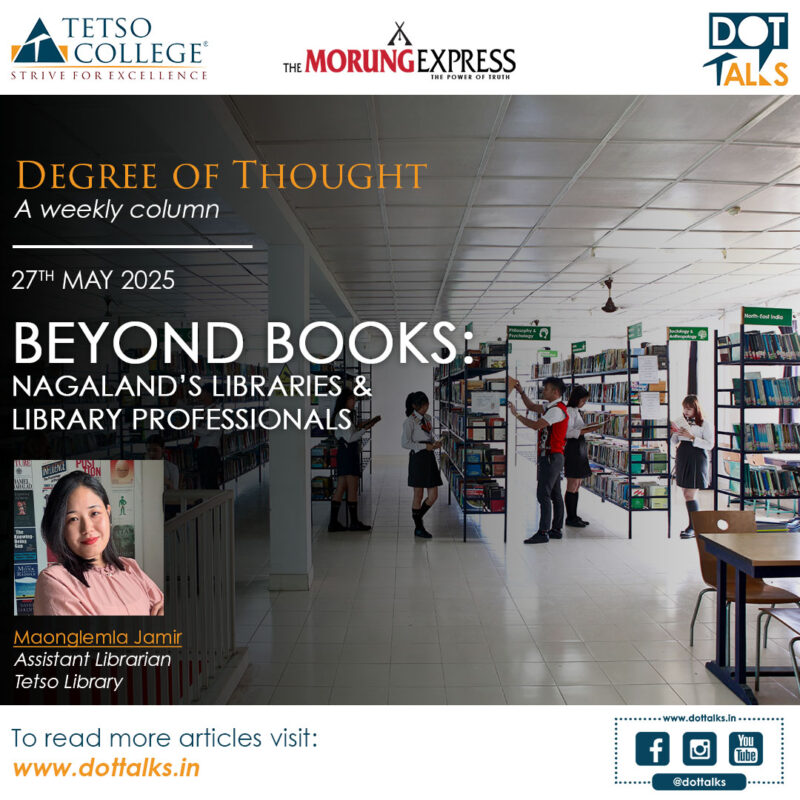Beyond Books: Nagaland’s Libraries & Library Professionals
Let’s be honest, when people hear the word “library” the first image that pops into their mind is a quiet room filled with dusty books and someone hissing “silence please.” But libraries are far more exciting than that! Behind the calm exterior is a world full of information, innovation, and impact. Especially in a growing and knowledge-hungry region like Nagaland, it’s time we ask ourselves: Are we really giving enough attention to the people and systems that help us access, organize, and preserve knowledge?
As someone who has been working in the library field, I can confidently say, libraries are not just about stacking books or Issuing books. It’s about empowering students, supporting educators, and making information accessible to everyone. And in Nagaland, where curiosity and creativity abound, investing in this field could unlock enormous potential.
Libraries have traditionally been called the “heart of an institution.” In schools, colleges, universities, and public spaces, libraries serve as centers of self-learning, research, community engagement, and cultural preservation. It’s not just about borrowing books; it’s about building informed citizens. In a region like Nagaland, where access to quality educational resources can be uneven, libraries bridge the gap between knowledge and opportunity.
When well-equipped and well-managed, libraries empower students from all backgrounds, especially in rural and remote areas to dream beyond the classroom. With digital resources, reference materials, and trained library professionals, these centers become catalysts of change. But this transformation is possible only when library & Information science is treated as a vital part of the educational and developmental ecosystem.
To be a Library Professional, one needs to be specialized in library and information science by getting a master’s degree like any other degree, not more or not less. It is a specialized field that is not only confined to information management, digital archiving, cataloguing, research support, and user services, but it also seeks to understand and assess the behavioural sciences of an individual using information in every aspect of an individual life. The discipline itself seems to be evolving each day with new challenges with the exponential growth of information every second and with the Artificial intelligence and information explosion, the skills of a Library Professional is indispensable and cannot be undermined.
However, in many parts of Nagaland, library positions are either unfilled or underutilized. Many educational institutions lack professionally trained librarians. This is not due to a lack of capable individuals, but rather due to limited recognition of the profession and fewer opportunities for growth. Investing in library & Information science education and creating more job avenues can change this reality.
One of the major challenges in Nagaland is the lack of infrastructure and consistent funding for libraries. Many school and college libraries operate with outdated collections and minimal space. There is also a lack of awareness among administrators and policymakers about the evolving role of libraries in education and development. Another pressing issue is the absence of a strong policy framework for library development in the state. While some institutions take individual initiatives to improve their libraries, a state-level push is needed to ensure uniform progress. The integration of library services in academic planning, budgeting, and digital initiatives remains weak and needs immediate attention.
Nagaland stands at a fork on the road where tradition meets progress. In this transition, knowledge will be the key driver of sustainable development and at the core of knowledge management lies library & Information Science, a profession that quietly supports learning, research, innovation, and cultural preservation.
Investing in libraries and the people who run them is not just about buildings or books. It is about investing in minds, futures, and communities. As we move toward a more informed and inclusive society, it is time for Nagaland to place library & Information science where it truly belongs at the center of its educational and developmental vision.
In a state like Nagaland where young minds are bursting with curiosity and institutions are eager to grow, we need skilled information managers, digital resource specialists, and knowledge curators. That’s exactly what Library and Information Science prepares students to become. Yet, the course continues to fly under the radar, overshadowed by more “mainstream” options. Let us reimagine libraries not as silent rooms full of old books, but as active, inclusive, and vibrant spaces that empower people across all walks of life. It begins with recognition. It continues with investment. And it flourishes with commitment.
In conclusion, it is time we move beyond outdated perceptions of libraries and recognize their true potential as engines of growth, equity, and innovation—especially in a state like Nagaland, where access to quality information can transform lives. Library and Information Science is not a secondary field; it is a cornerstone of education, research, and societal progress. By investing in trained professionals, modern infrastructure, and supportive policies, we can reimagine libraries as inclusive, future-ready spaces that serve every community. The journey begins with awareness, grows with action, and succeeds with collective commitment. Let us give libraries and library professionals the spotlight they rightfully deserve.
Degree of Thought is a weekly community column initiated by Tetso College in partnership with The Morung Express. Degree of Thought will delve into the social, cultural, political and educational issues around us. The views expressed here do not reflect the opinion of the institution. Tetso College is a NAAC Accredited UGC recognised Commerce and Arts College. The editorial team includes Chubamenla, Asst. Professor, Dept. of English and Rinsit Sareo, Asst. Manager, IT, Media & Communications.
For feedback or comments please email: dot@tetsocollege.org

